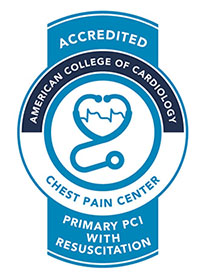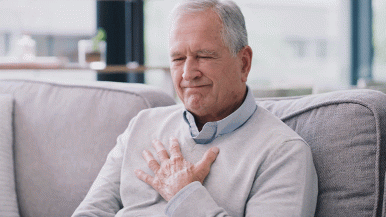RUSH Copley Medical Center has been recognized by the American College of Cardiology for expertise and commitment in treating patients with chest pain. The hospital was awarded Chest Pain Center Accreditation based on rigorous onsite evaluation of the staff’s ability to evaluate, diagnose and treat patients who may be experiencing a heart attack.
 In addition, RUSH Copley received a mark of distinction as a chest pain center with primary PCI and resuscitation accreditation. Also called coronary angioplasty, PCI — or percutaneous coronary intervention — is a non-surgical procedure that opens narrowed or blocked coronary arteries with a balloon to relieve symptoms of heart disease or reduce heart damage during or after a heart attack.
In addition, RUSH Copley received a mark of distinction as a chest pain center with primary PCI and resuscitation accreditation. Also called coronary angioplasty, PCI — or percutaneous coronary intervention — is a non-surgical procedure that opens narrowed or blocked coronary arteries with a balloon to relieve symptoms of heart disease or reduce heart damage during or after a heart attack.
“This accreditation demonstrates our commitment to providing excellent heart care,” says RUSH cardiologist Gaurav Shah, DO, who treats patients in Aurora and Yorkville. “We provide quality care with compassion to give patients the best possible outcomes.”
Hospitals that have earned this accreditation have proven exceptional competency in treating patients with heart attack symptoms and have primary PCI available 24/7 every day of the year. They have streamlined their systems from admission to evaluation to diagnosis and treatment. This includes post-discharge care and recommendations and assistance in patient lifestyle changes. They also have a robust hypothermia program for post-cardiac arrest treatment.
Facilities that achieve accreditation meet or exceed stringent criteria and have organized a team of doctors, nurses, clinicians and other administrative staff who support the efforts leading to better patient education and improved outcomes.
“It’s of critical importance to treat heart attack patients immediately and correctly,” says Christopher Hwang, MD, emergency medicine physician at RUSH Copley. “Our caring team provides patients the area’s best heart care services and support.”
According to the Centers for Disease Control and Prevention, more than 800,000 Americans suffer a heart attack each year. The most common symptom of a heart attack for both men and women is chest pain or discomfort, although women may have atypical symptoms. Other symptoms include tingling or discomfort in one or both arms, back, shoulder, neck or jaw; shortness of breath; cold sweat; unusual tiredness; heartburn-like feeling, nausea or vomiting; sudden dizziness and fainting.




